Founded in Saudi Arabia, Mirai Solar originated at King Abdullah University of Science and Technology (KAUST) to utilize solar energy in regions with abundant sunlight. "We started in Saudi Arabia due to the natural advantages of sunlight there, but as we grew, the North American market, particularly the American Southwest, offered an even stronger opportunity," shares Michael Salvador, co-founder and CEO. Although the U.S. has become Mirai Solar's primary headquarters, they maintain a subsidiary in Saudi Arabia, balancing access to high-sunshine regions with robust market demand in North America.
The relocation to the U.S. also aligns with Mirai Solar's focus on markets where electricity prices make renewable energy economically more attractive. "In Saudi Arabia, electricity continues to be cheap, posing pressure on the levelized cost of electricity for small renewable energy projects," Michael notes. "In North America, however, the demand for sustainable energy solutions continues to rise, particularly within agriculture."
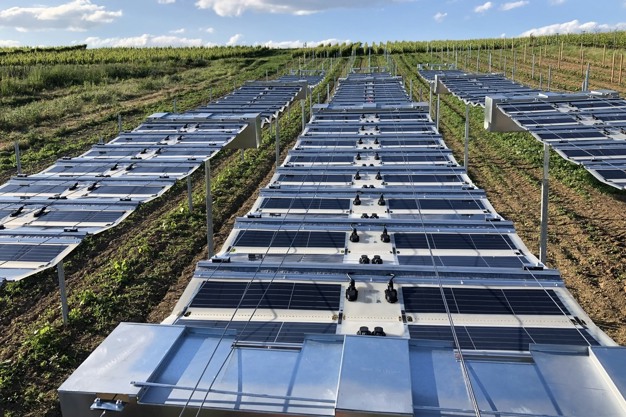 VitiCult project in Geisemheim, Germany, using Mirai Solar's photovoltaic shading system (top view). Reference: https://www.ise.fraunhofer.de/en/research-projects/viticult-pvmobil.html
VitiCult project in Geisemheim, Germany, using Mirai Solar's photovoltaic shading system (top view). Reference: https://www.ise.fraunhofer.de/en/research-projects/viticult-pvmobil.html
Solar technology: Retractable panel design
Mirai Solar's technology is a retractable solar panel system, specifically engineered to meet the demands of both greenhouse and open-field agriculture. The retractable design allows panels to fold into a protective housing, which shields them from weather events like storms and hail that could damage photovoltaic cells and environmental factors like soiling. "Our retractable system is what sets us apart," Michael explains. "When not in use, the panels fold into a protective enclosure, adding durability and flexibility. This mechanism is essential for outdoor applications, where there's no roof covering, as in greenhouses."
Initially, Mirai Solar focused on greenhouses due to their typically high energy demands. In greenhouse settings, the panels reduce operational costs by providing a renewable source of electricity, offsetting greenhouse lighting and heating/cooling expenses. However, Mirai Solar's retractable panels are now being adapted for outdoor applications, allowing farms to access solar energy even in open fields, an approach that expands the system's use beyond typical controlled environments.
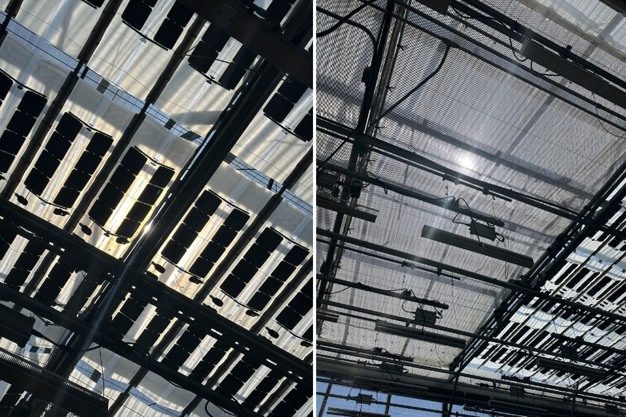 Donald Danforth Plant Science Center in St Louis, MO: a side-by-side study of the Mirai Screen with conventional shade screens (with the generous support of the Wells Fargo Innovation Incubator, IN²)
Donald Danforth Plant Science Center in St Louis, MO: a side-by-side study of the Mirai Screen with conventional shade screens (with the generous support of the Wells Fargo Innovation Incubator, IN²)
Customized solutions for shade-loving and light-sensitive crops
Mirai Solar's technology is customized to support specific crop types, particularly shade-loving and light-sensitive crops. The company's primary focus includes leafy greens, lettuces, and even grape vineyards, which increasingly require protection from extreme sunlight and seasonal frost. "Our technology is particularly beneficial for shade-loving crops," says Michael. "Beyond leafy greens and lettuces, we're now working with vineyards, where grapes benefit from protection against excessive heat and solar irradiation in the summer and frost during the winter."
Mirai Solar is offering a dual-purpose design as part of their system, providing year-round crop protection. By limiting the intensity of sunlight exposure during peak times, their system reduces heat stress on crops and prevents quality degradation, especially valuable for grape production. In winter, the same retractable technology helps insulate crops against frost damage, providing added value and yield security to farmers operating in variable climates.
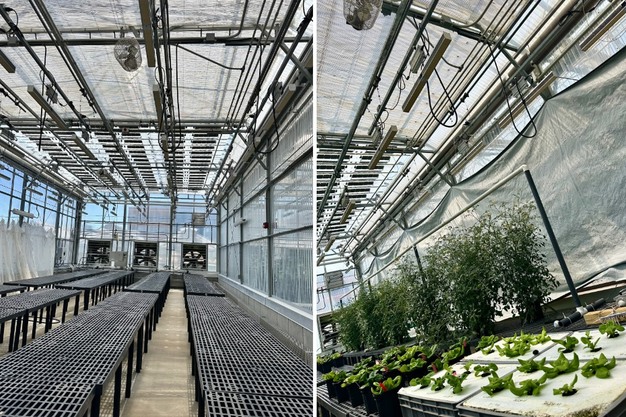
Donald Danforth Plant Science Center in St Louis, MO: a side-by-side study of the Mirai Screen with conventional shade screens (with the generous support of the Wells Fargo Innovation Incubator, IN²)
Flexible power usage and storage solutions
Energy storage and distribution are key considerations in agricultural solar power, particularly in outdoor applications where energy demands vary throughout the day. "One of the questions we ask is, where does the electricity go when it's produced?" Michael says. In greenhouse setups, the generated power directly meets lighting, heating, and cooling demands, particularly in peak sunlight conditions, when cooling demand and generation are naturally aligned. This makes greenhouses a "closed-loop" system for energy use.
In outdoor fields, Mirai Solar is exploring flexible options for power utilization, such as electric tractors and nearby food processing facilities. "Imagine an electric tractor or a food processing and storage unit nearby," says Michael. "By directing surplus electricity to these operations, farms can make full use of generated power, even in open fields." This will be particularly beneficial in off-grid or remote agricultural areas, reducing the need for external power sources and enabling operations to be both sustainable and independent. This type of electrification represents one path towards decarbonizing agricultural production.
Scaling up: From pilot projects to large-scale agricultural implementation
Currently, Mirai Solar's technology is deployed in demonstration projects, with several hundred square meters. However, the company is focused on scaling its systems to meet commercial agricultural needs, including installations spanning several hectares. "Our aim is to move from smaller-scale demonstrations to larger, commercial-scale systems," Michael explains. "To meet this goal, we're investing in automated production processes to increase our manufacturing capacity."
This shift will allow Mirai Solar to deliver solar systems that can meet higher production demands. By expanding production capabilities, Mirai Solar can support large-scale farms in transitioning to renewable energy.
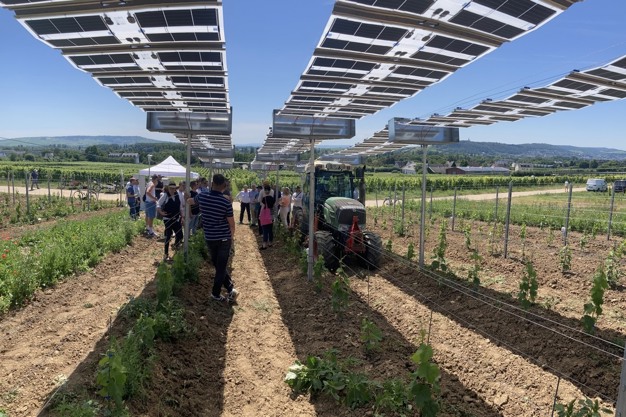
VitiCult project in Geisemheim, Germany, using Mirai Solar's photovoltaic shading system (field view). Reference: https://www.ise.fraunhofer.de/en/research-projects/viticult-pvmobil.html
International collaboration with German technology experts
Mirai Solar's growth has been supported by partnerships with German collaborators including Novavert, who contributes expertise in systems integration. "Our focus has always been on solar technology itself, but integrating it into different agricultural scenarios requires specialized knowledge," Michael explains. "Novavert has been crucial in designing versatile systems that function effectively in diverse climates and crop types."
Recent projects in Irvine, California, St. Louis, MO, and Germany showcase this collaboration, where the Novavert team helped Mirai Solar develop a system optimized for local agricultural needs. Similarly, Mirai Solar is partnering with growers, solar project developers, and community programs. Community involvement is an important pillar of Mirai's vision. For instance, in California Mirai works closely with the non-profit Community Power Collaborative.
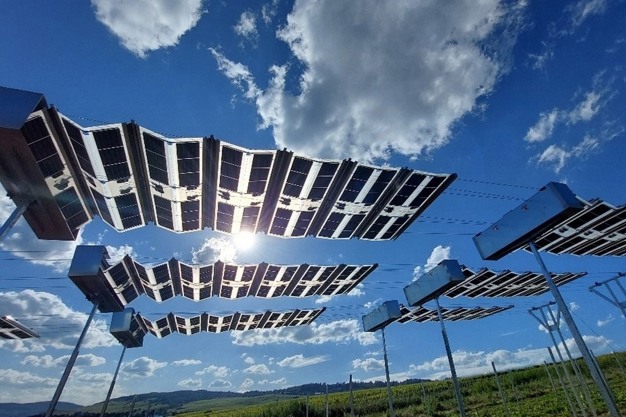
VitiCult project in Geisemheim, Germany, using Mirai Solar's photovoltaic shading system (side view). Reference: https://www.ise.fraunhofer.de/en/research-projects/viticult-pvmobil.html
Recognition from the U.S. Department of Energy (DOE)
Mirai Solar received a grant from the U.S. Department of Energy (DOE) to further develop its solar systems for open-field farming. "Recognition from the DOE is a big validation for us," Michael says. "This grant will enable us to advance our technology specifically in the context of agrivoltaics, which is gaining traction in the U.S." The DOE grant is part of a broader initiative to promote sustainable practices within agriculture, as upgrading infrastructure becomes increasingly costly. By funding innovative solar projects, the DOE aims to support agricultural resilience while reducing pressure on the national energy grid.
"Our vision is to create energy solutions that not only reduce operational costs for growers but also contribute to a sustainable future," shares Michael.
Mirai Solar also placed second in the Mega Green Accelerator program, a scheme to promote environmental startups in the Middle East
For more information:
Mirai Solar
miraisolar.com
